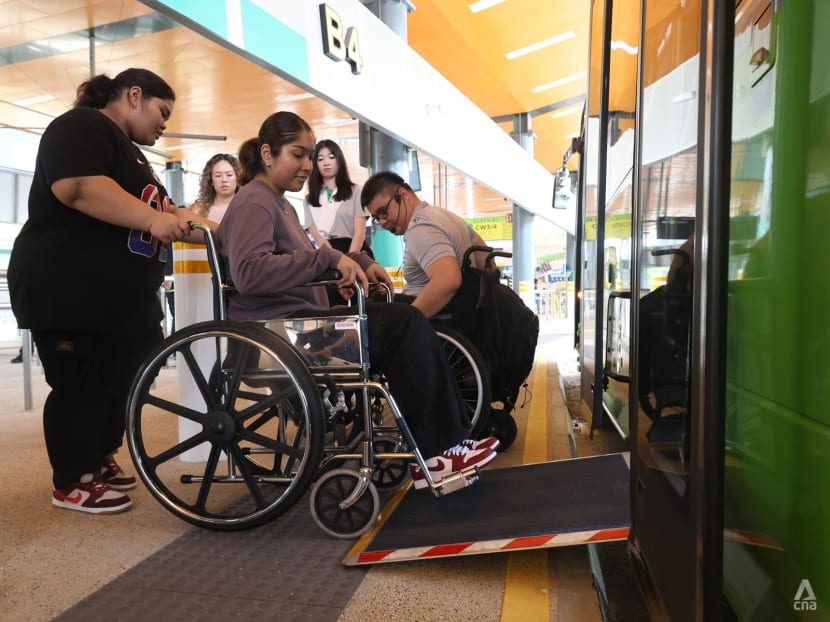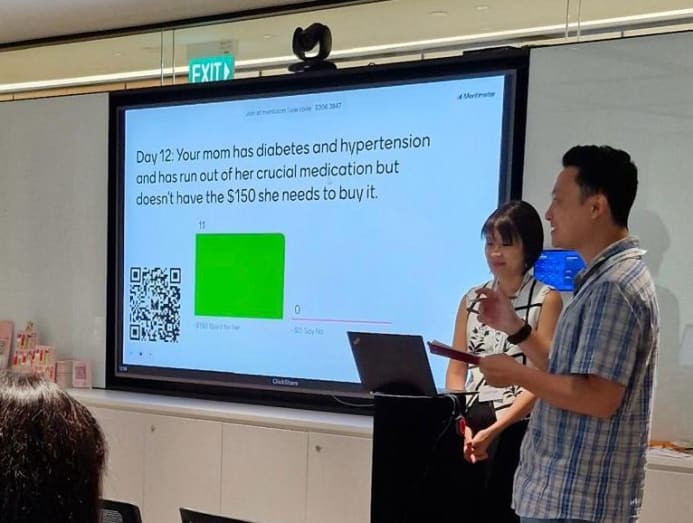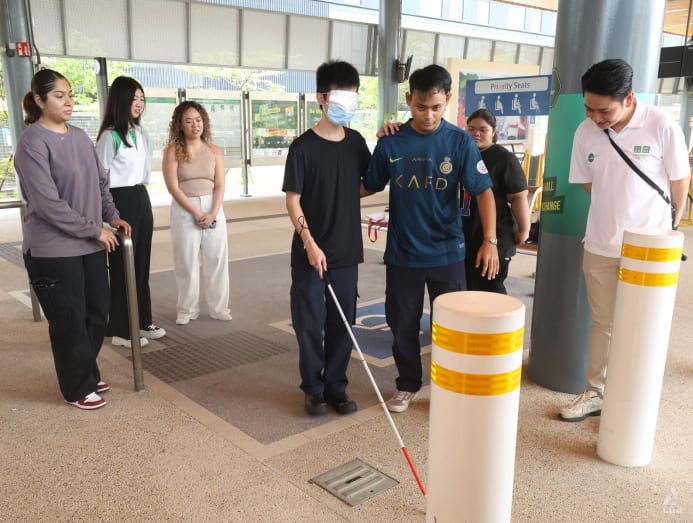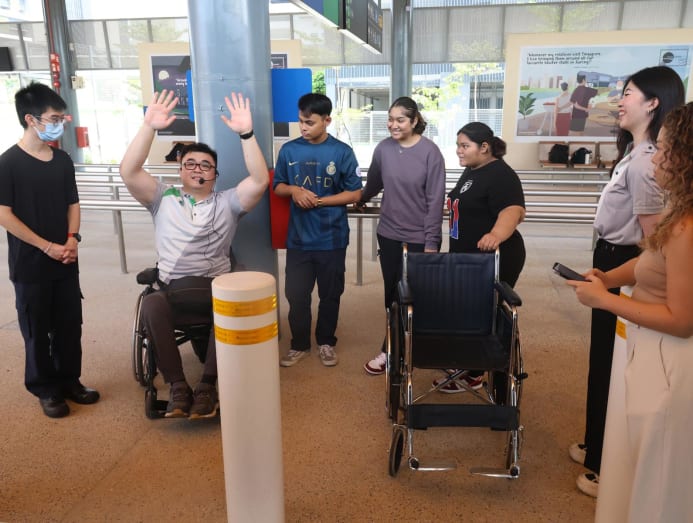Once slammed for insensitivity, empathy-building programmes that simulate poverty, disabilities are getting popular
More people are signing up for workshops that offer “simulations” of poverty and physical disabilities to teach the values of empathy. But do they really work?

Students from the Institute of Technical Education at an inclusivity workshop conducted by Tower Transit Bus on Oct 30, 2024. (Photo: CNA/Ooi Boon Keong)

This audio is generated by an AI tool.
Having worked in the nonprofit sector, the founder of Annie’s All Natural Haanee Tyebally is no stranger to working with underprivileged individuals.
Yet, nothing could prepare her for the sobering experience of stepping into the shoes of a single mother on a shoestring budget.
During a "poverty sensitisation" workshop by charity Daughters of Tomorrow (DOT) in April, Ms Tyebally was given a budget of S$600 and tasked with a series of difficult choices to survive as a single mother of two for a month.
The character she played had to deal with seemingly endless bills, the pressure of making a good impression on a new boss, and the need to make several financially-driven choices that could lead to trade-offs.
Should she allow her child to go on a pricey class excursion and feel guilty for spending more money on something optional? Or, if she is running late for work, should she take a taxi or just take the hit and risk the wrath of her boss?
Ms Tyebally, whose business makes cultured dairy products and who also has experience in social work across Southeast Asia, still recalls how the stress from the two-hour workshop "did not go away" months later.
DOT's workshop, which is called This is My Experience, has led the Singaporean to reflect deeply on how to build a more inclusive workplace and hire one of the organisation’s beneficiaries.
“The role-playing aspect really helped contextualise the pressure under which (someone in such circumstances has to) make decisions," said the small business owner.
"There are these external factors (they have to deal with) ... which made me think about how I can be mindful (in) the workplace."
However, such workshops that feature an element of simulation have not always been so well-received.
In 2016, the Singapore Island Country Club (SICC) caught flak after the news that Methodist Welfare Services (MWS), a voluntary welfare organisation, would be conducting a poverty simulation exercise for its members at the club.
The news involving the prestigious country club, where membership rates start at S$36,000 a year, caused controversy at the time. Several online commentators called the initiative condescending and offensive to the less wealthy.
An MWS spokesperson said at the time that the exercise aimed to stir compassion and nudge participants to do more for the community by raising awareness of the realities that people living in poverty face daily.
Despite the outcry at the time over the incident, organisers of empathy workshops that incorporate some degree of simulation say that these programmes have surged in popularity, with many people inquiring about their availability.
DOT began running sessions in 2016 for its prospective corporate partners, members of the public and volunteers. Since then, they have been able to increase the frequency of these poverty sensitisation workshops over the years due to rising demand.
The charity told CNA TODAY that it currently conducts about 15 runs a year and has observed “seasonal peaks” in interest, especially during International Women’s Day and the year-end.
Over the years, there have also been more such workshops catering to varying causes.
Apart from poverty simulation, some workshops focus on training empathy towards people with disabilities, older folks coping with ageing issues, as well as patients experiencing certain medical conditions.
These programmes do not allow participants to fully understand what it is like to live with chronic poverty or navigate daily life with a disability, which only lived experiences can provide, and the workshops do not also claim to achieve this.
But they are meant to raise awareness by giving participants a taste of what it is like to walk a mile in the shoes of someone else's life.
In the transport scene, for example, some bus operators also allow participants to experience what it is like to ride on public transport with mobility challenges.
Tower Transit's Public Bus Inclusivity Workshop, for instance, has taken in more than 250 participants who are mostly school students and members of the public, since its launch in April 2021.
Tower Transit said that participation in the workshop has grown in recent years, from 21 participants in 2021 to 121 in 2024.
To find out why these programmes have become so popular, CNA TODAY attended a series of workshops by three organisations to see how trainers build empathy and sensitivity among participants and what they gain in the process.

WHAT EMPATHY WORKSHOPS ARE LIKE
In general, these workshops seek to allow participants to physically experience and learn about the unique challenges faced by others who have different circumstances from them.
Some social enterprises, such as WeHiro's ageing simulation programme, allow young participants to experience what it is like to be frail and elderly by wearing physical restraints or going through a scheduled timetable at a nursing home.
Another nonprofit group, Etch Empathy, conducts events to cultivate empathy for vulnerable people, such as the poor, elderly, and blind.
At Tower Transit's workshop, CNA TODAY witnessed one activity in which blindfolded participants used a guide cane to simulate how visually impaired commuters board a bus, with other participants assisting them in finding a seat.
The Tower Transit workshop is free to members of the public and they can either sign up online or scan the QR codes at bus interchanges indicating their interest. Taking an experiential and hands-on approach, attendees learn how to be more attentive to the challenges other commuters with mobility challenges or disabilities face.
Institute of Technical Education (ITE) student Muhammad Hariths, 19, said being blindfolded during the activity made navigating the bus interchange “quite difficult”.
He added that going up and down the bus “felt quite terrible” and stepping down from the bus to the interchange was particularly nerve-wracking when he was blindfolded.
“It's very helpful when someone is there for those who are visually impaired,” said the student.
But some workshops also test participants' empathy through non-physical means.
In DOT's This is My Experience workshop, participants are given 30 questions to simulate a month in the life of a low-income single mother living in a rental flat. They navigate tough decisions, such as how to pay for transport, groceries, and utilities while determining which expenses to forgo.
On the first day of the simulation, attendees receive a S$600 budget. The next day, rent and utilities totalling S$200 are due immediately. Thus, participants face a challenging choice - either spend one-third of their monthly budget with most of the month left to go or delay payment and risk eviction.
DOT's executive director Kaylee Kua said that the workshop targets prospective corporate partners, volunteers and members of the public, and pushes participants to make difficult choices in a compressed timeframe, much like those faced by many of the charity’s beneficiaries.
Ms Kua added that the scenarios, based on real-life experiences shared by the charity’s clients, are designed to help attendees better understand the chronic stress, uncertainty, and emotional toll poverty takes on families.
The charity conducts both community and paid runs for organisations, and staff of DOT’s employer partners are highly encouraged to attend the workshops as a “starting point” to making their hiring practices more inclusive.
Elsewhere, the simulation concept is also often deployed in workshops by the medical community.
While medical education often involves the biological sciences and technology, holistic healthcare is made possible through the emerging field of medical humanities, which involves arts, humanities and social sciences, to cultivate empathy.
Put simply, medical humanities use art and literature to train medical students and healthcare workers so that they better understand what their patients are going through.
In one such workshop attended by CNA TODAY on Oct 29, titled The Power of Story: A Narrative Medicine Experience, participants explored the lives of people through poems and paintings in order to better understand the life circumstances of others.
The session, which was part of the 2024 Singapore Medical Humanities Conference organised by SingHealth Duke-NUS Academic Medical Centre, asked healthcare workers to read a poem and reflect on a painting that portrays doctors examining a patient in the 1800s.
CNA TODAY also saw how attendees were asked to contemplate how much dignity was afforded to the patient at the time.
Through their attempts to understand the experiences of the patients behind the image or text, the attendees learn close-reading and listening skills that allow them to be more empathetic to the patients that they see in their daily work.

TEACHING EMPATHY CREATIVELY
Instead of being taught an "abstract" concept of what living with poverty is like, Ms Tyebally, the participant at DOT's workshop, said being able to try out the perspective of someone living hand-to-mouth was far more impactful in showing the stress faced by someone experiencing financial hardship.
She noticed other participants being more liberal about their spending at the start of the workshop, such as being willing to fork out sums on reskilling courses or healthier groceries, before becoming more hesitant to spend later as they realised how limited their resources were.
While employers may be aware of the limitations faced by those in financial hardship through reading articles or being aware of workforce statistics, "it's an incredibly different experience to say, ‘I'm going to block out two to three hours of my time, and going to be present for this’," said Ms Tyebally.
"(This workshop) causes you to reflect and resonate with an issue in a very different way,” she added.
On why this method works for poverty sensitisation, Ms Kua said the charity hopes to educate attendees on common misconceptions about poverty in Singapore by sharing insights into "multi-stressed" lower-income families.
Noting that the charity was aware of public feedback regarding similar poverty sensitisation workshops in the past, Ms Kua said the charity draws the examples it uses from "real-life scenarios" and aims to present the chronic effects of living on limited means, albeit in a condensed form.
She highlighted that a majority of DOT’s clients live in one- or two-room HDB rental flats but face obstacles such as limited access to resources and networks as well as possess lower educational qualifications, which impede their ability to secure higher-paying jobs.
Thus, having an experiential workshop can spur employers to redesign jobs to accommodate more suitable working hours while fulfilling their manpower needs, said Ms Kua.
Likewise, raising awareness this way and learning how to be empathetic to others helps medical workers provide better healthcare, since professionals have to interact with patients in complex ways.
Dr Tanya Tierney, assistant dean of clinical communication at Nanyang Technological University (NTU) Lee Kong Chian School of Medicine, said: “By exploring patient and clinician stories, for example, students cultivate empathy for people in various situations.
“The rich discussions invite them to think about medical topics and the human experience in different ways and explore how they may respond.”
Associate Professor Devanand Anantham, director of the SingHealth Duke-NUS Medical Humanities said that while the clinical practice of medicine will always be the priority, incorporating the arts and music can improve observational skills and listening skills, making doctors “better diagnosticians”.
He said such courses can help medical professionals understand cultural and religious sensitivities too.
Assistant Professor Michelle Chiang of NTU's School of Humanities and its Medical Humanities Research Cluster added that such an understanding goes beyond creating an emotional connection between doctor and patient.
"It enhances the ability to provide holistic care by affording healthcare professionals with multiple points of view to regard the patient as a whole person, instead of just a sum of their symptoms,” said Asst Prof Chiang.
Reflecting a similar goal of building empathy through real-life scenarios, a Tower Transit spokesperson told CNA TODAY that the transport course aims to build a more inclusive public transport experience by attuning commuters to the needs of “vulnerable commuters”.
“We understand that many people want to help but may hesitate due to uncertainty or fear of offending others. Our goal is to shift that mindset and encourage more proactive support,” said the spokesperson.
The Tower Transit spokesperson said the course’s case scenarios and content were designed in collaboration with disability services and support organisation SG Enable, the Singapore Association of the Visually Handicapped and Guide Dogs Singapore.
As the course is facilitated by Tower Transit staff members who are wheelchair users, they can share their personal experiences during the workshop.
Mr Kishon Chong, 32, a senior customer experience and inclusivity officer from Tower Transit and facilitator, said a workshop like this is a “good start”.
“Public awareness of disability is not very common and it's also not something that is taught in our education system,” said Mr Chong, who is also a wheelchair user.
“By providing a more realistic space with experiential, hands-on case scenarios, they (participants) can learn and empathise a lot.”
He added that Tower Transit is looking to expand the course to cover conditions like dementia, intellectual disabilities, and autism in 2025.
Tower Transit’s spokesperson said the course does not make participants “experts in disabilities”. Rather, the goal is to help them better understand commuters with different needs and equip them with the “empathy and confidence” to help someone in need while taking public transport.
He added that there is also a complementary course designed for persons with mobility challenges and disabilities to train their confidence in taking public transport. This course includes route planning and practical sessions to practise boarding, riding and alighting.

FROM ROLE-PLAY TO REAL LIFE
Several attendees of these programmes told CNA TODAY that participating in the workshops led to meaningful actions in their daily lives.
After the Tower Transit workshop, Terry Lee Jun, 17, said he is now more aware of why wheelchair users need a wide space to get on the bus.
“It might seem easy, but you have to be very cautious. You can get your wheel trapped on the ramp,” said Terry, a year 1 ITE student, after pushing a peer on a wheelchair up the bus ramp during the course.
Like him, 17-year-old participant Nurul Fitrah also never considered how the commuter experience would be different for someone who is visually impaired or a wheelchair user but now feels more confident about lending a helping hand.
“I can just ask them if they need help. If they don't, it’s okay. If they do, I will try my best to help,” said Fitrah, who is also a year 1 ITE student.
For those in the medical field, cultivating empathy through humanities workshops meant needing to take a step back away from a pure focus on hard science and facts.
Junior doctor Koh Ying Ying, 25, said she sees medical humanities as a way to make sense of many highs and lows of medicine.
“The (narrative medicine) session gives us the space to reflect on events and things that happen. Sometimes, in medicine, you deal with a lot of death, patients who are sick and at the end of life,” said Ms Koh, who also started a student organisation called the medical humanities collective at NUS.
At DOT, Ms Kua also saw how much of a lasting impression the course left on attendees. For instance, one lactation pod startup ended up hiring a DOT beneficiary in the same year after its staff members took part in a workshop.
The firm also established a traineeship programme designed to onboard more of the charity’s clients, who are mostly lower-income women, about half of whom are single mothers.
To support work-life balance, the company also implemented flexible policies, allowing employees to bring their children to work when necessary and work from home if their children are unwell.
After an extended break from the workforce, one of DOT’s beneficiaries found employment at Annie’s All Natural as a food production assistant in September.
Ms Tyebally said that her decision to hire one of the charity’s beneficiaries stemmed from an alignment in values with DOT, which aims to help underprivileged women access job opportunities.
She added that the workshop was useful in teaching employers to look beyond an applicant’s paper qualifications and consider how an individual could grow to be a good fit for one’s company, even if they do not seem immediately suitable.
Attending the poverty sensitisation workshop helped her company prepare and become aware of her new team member’s circumstances.
“Attending a workshop like this ... helps you become a more empathetic, mindful employer. That’s only going to help you get the best version of your employee," she said.










